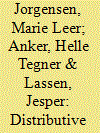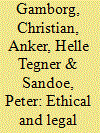| Srl | Item |
| 1 |
ID:
171503


|
|
|
|
|
| Summary/Abstract |
To address increasing opposition to wind projects in Denmark three compensation schemes were introduced in the 2008 Renewable Energy Act. The aim was to address issues of distributive fairness and thereby to increase local acceptance. This paper analyses the role of two individual compensation schemes – the property value-loss scheme and the co-ownership scheme – on local citizens’ perceptions of fair distribution of the benefits and burdens of wind energy projects. The qualitative case study of three Danish wind energy projects discloses that distributive unfairness was a prevalent concern among local citizens, and that this concern was inseparable from perceptions of procedural fairness and recognition. The key conclusion is that the two compensation schemes are not successfully offsetting perceptions of unfair distribution. The schemes are challenged by a multitude of intertwined concerns. The compensation schemes are not equipped to address the plethora of non-monetary values affected by the wind projects. Specifically the compensation schemes are criticised for not offering adequate local benefits or distribution thereof, equal access, fair procedures and transparency. In fact the schemes were by some considered unfair and created perceptions of lack of recognition and bribery which undermined their role in promoting distributive fairness and local acceptance.
|
|
|
|
|
|
|
|
|
|
|
|
|
|
|
|
| 2 |
ID:
132667


|
|
|
|
|
| Publication |
2014.
|
| Summary/Abstract |
The article focuses on the interplay between two factors giving rise to friction in bioenergy governance: profound value disagreements (e.g. the prioritizing of carbon concerns like worries over GHG emissions savings over non-carbon related concerns) and regulatory complexity (in terms of regulatory measures and options). We present ethical and legal analyses of the current stalemate on bioenergy governance in the EU using two illustrative cases: liquid biofuels for transport and solid biomass-based bioenergy. The two cases disclose some similarities between these two factors, but the remaining differences may partly explain, or justify, contrasting forms of governance. While there seems to be no easy way in which the EU and national governments can deal with the multiple sustainability issues raised by bioenergy, it is argued that failure to deal explicitly with the underlying value disagreements, or to make apparent the regulatory complexity, clouds the issue of how to move forward with governance of bioenergy. We suggest that governance should be shaped with greater focus on the role of value disagreements and regulatory complexity. There is a need for more openness and transparency about such factors, and about the inherent trade-offs in bioenergy governance.
|
|
|
|
|
|
|
|
|
|
|
|
|
|
|
|